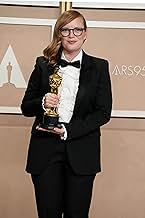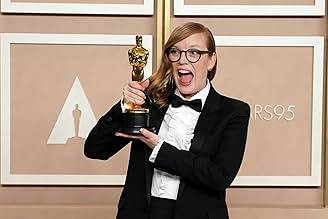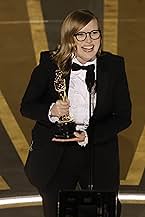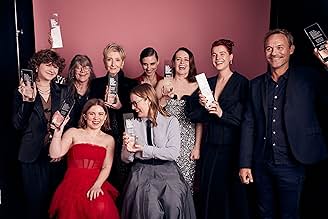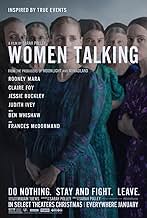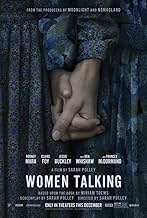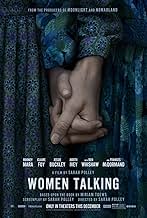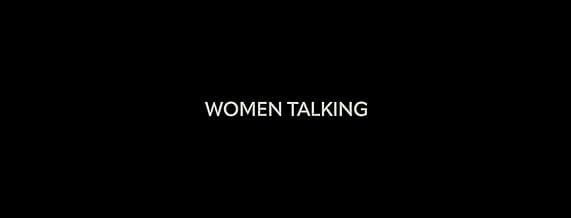Do nothing, stay and fight, or leave. In 2010, the women of an isolated religious community grapple with reconciling a brutal reality with their faith.Do nothing, stay and fight, or leave. In 2010, the women of an isolated religious community grapple with reconciling a brutal reality with their faith.Do nothing, stay and fight, or leave. In 2010, the women of an isolated religious community grapple with reconciling a brutal reality with their faith.
- Won 1 Oscar
- 65 wins & 166 nominations total
- Director
- Writers
- All cast & crew
- Production, box office & more at IMDbPro
Featured reviews
Sarah Polley's 'Women Talking' did not work for me. This story of a group of women - all of whom belong to a U. S. religious sect in the 1960's - who are physically and emotionally abused by their menfolk / husbands, seems more like a dispassionate, politically correct lecture, than a dialogue between real people. Real people in pain. And it should not have had that effect. Particularly in these times when the news is filled with detailed descriptions of what real men do to real women.
Rooney Mara, Claire Foy, and. Jesse Buckley play three young women who had been drugged and sexually accosted, and who are now part of a 'commission' asked to decide what the community's women's next steps should be. Should they remain in the community and say / do nothing, remain and fight back, or pack up and leave? In making their decision, each of the three young women describes their lives and their reasons for voting as they do. Rooney Mara's character seems the most undecided, willing to see all sides of the argument and taking different positions over the course of the film. Claire Foy is angry and outspoken but I found it difficult to ascribe a preferred next-step to her. Jesse Buckley is the angriest and, at first, the most unwilling to leave her abusive husband, and it is that - her failure to realize how abused she is - that made me care less about her than I should.
Two senior women participate in the commission and one, played by Judith Ivey - made the strongest impression on me. She has the wisdom that comes with age and the ability to put it into words. Ben Whishaw as the one man invited to the commission brings a startling honesty to the proceedings; he more than anyone knows the evil men can do.
But for me, the film's 'failure' involves the three young women. There is a cold and distanced quality to their recitals. It is as though they are relating a film they saw, a book they read, rather than expressing the anger, the anxiety, the fear they all know very well.
I should have been moved. I should have been angered. I should have been relieved. But I was not.
Rooney Mara, Claire Foy, and. Jesse Buckley play three young women who had been drugged and sexually accosted, and who are now part of a 'commission' asked to decide what the community's women's next steps should be. Should they remain in the community and say / do nothing, remain and fight back, or pack up and leave? In making their decision, each of the three young women describes their lives and their reasons for voting as they do. Rooney Mara's character seems the most undecided, willing to see all sides of the argument and taking different positions over the course of the film. Claire Foy is angry and outspoken but I found it difficult to ascribe a preferred next-step to her. Jesse Buckley is the angriest and, at first, the most unwilling to leave her abusive husband, and it is that - her failure to realize how abused she is - that made me care less about her than I should.
Two senior women participate in the commission and one, played by Judith Ivey - made the strongest impression on me. She has the wisdom that comes with age and the ability to put it into words. Ben Whishaw as the one man invited to the commission brings a startling honesty to the proceedings; he more than anyone knows the evil men can do.
But for me, the film's 'failure' involves the three young women. There is a cold and distanced quality to their recitals. It is as though they are relating a film they saw, a book they read, rather than expressing the anger, the anxiety, the fear they all know very well.
I should have been moved. I should have been angered. I should have been relieved. But I was not.
In 2010, the women of a Mennonite community must come together to make a decision following the discovery of a terrible secret of the men in their community. There are three options: do nothing, stay and fight, or leave. Great. The incipit is undoubtedly as interesting as it is a thriving ground for opening an important dialogue on concepts such as faith, misogyny, and feminism.
While it is an important film, and an important issue, I found the script to be profoundly insincere and artificial, in dialogue that is more like a skein of feminist slogans piled one after another. The way the characters express themselves, interact, and behave is mechanical and relegated to the stereotype of women they represent. To the most controversial character, McDormand's, I was sorry that, even in her being at fault, no space was left.
On a technical level there is nothing particularly significant; the coloring is interesting, if not particularly aesthetic. The performances of course were good, as the cast is mostly made up of great actresses.
Women Talking is commendable in its intended message, but otherwise it seems a wasted opportunity of cast as much as of reference material.
While it is an important film, and an important issue, I found the script to be profoundly insincere and artificial, in dialogue that is more like a skein of feminist slogans piled one after another. The way the characters express themselves, interact, and behave is mechanical and relegated to the stereotype of women they represent. To the most controversial character, McDormand's, I was sorry that, even in her being at fault, no space was left.
On a technical level there is nothing particularly significant; the coloring is interesting, if not particularly aesthetic. The performances of course were good, as the cast is mostly made up of great actresses.
Women Talking is commendable in its intended message, but otherwise it seems a wasted opportunity of cast as much as of reference material.
I'll admit up front that this is likely going to be an unpopular review and a decidedly minority opinion, but I have to be honest about my feelings. Writer-director Sarah Polley's adaptation of Miriam Toews's novel of the same name may come from a place of noble intent, and it may feature one of the year's finest acting ensembles, but its overall treatment is a major misfire. This fact-based story about a group of women from a conservative religious colony who meet to discuss how to respond to a series of sexual assaults in their community unfolds in a circular, wooden, stagey fashion that plays more like a university discussion group than a work of dramatic cinema. The ideas raised in these dialogues - ranging from activism to passivity to intergender relations to forgiveness to faith and salvation - are certainly lofty topics for consideration and deliberation, especially in terms of how they might be addressed in the forging of a new and better world. But their handling here is so forced and inauthentic that the entire exercise lacks believability and does little to foster a sense of concerted viewer engagement. And, as the narrative drones on and on, it becomes tediously dull, with one of the characters herself astutely observing that "This is very, very boring" (well said, if a bit ironic). What's more, a number of incidents and themes seemingly arise out of nowhere and aren't always fully resolved, making one wonder why they were included in the first place. Even more disappointing is the fact that the film features so many fine portrayals by performers who are given such stilted material to work with, including Jessie Buckley, Claire Foy, Judith Ivey, Sheila McCarthy, Ben Whishaw and Frances McDormand (whose appearance is more of an afterthought than anything else). Director Polley has certainly made a name for herself with such excellent past works as "Away From Her" (2006), but her reach has certainly exceeded her grasp with this undertaking, one that has much to say but ultimately says so little.
Powered by strong performances across the board, Women Talking follows the women of an isolated & ultraconservative community who take it upon themselves to decide the course of their future in the wake of a shattering revelation which compels them to reconcile their faith with their violent reality. Bracingly crafted & effectively told, it serves as a plea, a protest & a parable all at once.
Written & directed by Sarah Polley, the story borrows its premise from a real-life event and the film is an imagined response to it - a reaction through fiction. The disturbing truth surfaces in gut-punching ways as the women argue & discuss their next move while snippets of their past adds more weight to their collective pain, rage, fear & trauma. It does get repetitive but it also gets the point across with clarity.
The colour grading is an interesting choice, for it illustrates the bleakness of their existence in a colony ripe with unchecked male aggression but more could've been achieved with the camera. Still, what it lacks in cinematic qualities, it makes up in dramatic heft & strong emotional wallop, thanks to impressive work from the entire cast, ranging from Claire Foy's fierce rendition to Ben Whishaw's tender act, all enriching the narrative.
Overall, Women Talking is a timely, topical & thought-provoking drama that brims with hate, hurt & heartbreak in its illustration of the horrifying reality of female experience but there is also hope for a better future despite the agonising brutality of their past & present. Though there was more up for grabs which it fumbles with its very own creative choices, the commitment from the cast & searing intensity of their inputs makes it an essential viewing.
Written & directed by Sarah Polley, the story borrows its premise from a real-life event and the film is an imagined response to it - a reaction through fiction. The disturbing truth surfaces in gut-punching ways as the women argue & discuss their next move while snippets of their past adds more weight to their collective pain, rage, fear & trauma. It does get repetitive but it also gets the point across with clarity.
The colour grading is an interesting choice, for it illustrates the bleakness of their existence in a colony ripe with unchecked male aggression but more could've been achieved with the camera. Still, what it lacks in cinematic qualities, it makes up in dramatic heft & strong emotional wallop, thanks to impressive work from the entire cast, ranging from Claire Foy's fierce rendition to Ben Whishaw's tender act, all enriching the narrative.
Overall, Women Talking is a timely, topical & thought-provoking drama that brims with hate, hurt & heartbreak in its illustration of the horrifying reality of female experience but there is also hope for a better future despite the agonising brutality of their past & present. Though there was more up for grabs which it fumbles with its very own creative choices, the commitment from the cast & searing intensity of their inputs makes it an essential viewing.
You go to bed then wake up bruised, bloody, quite groggy and confused; you know instantly, that your body's been abused, your mind cannot conceive, all the torment and the grief, but you're not the only one, that's being used. So the women of the colony convene, to discuss the implications of what's been, carry on like there's no wrong, stay and fight which might prolong, or leave this place, put barriers between. The conversations, confrontations ebb and flow, the picture of what's taken place is shown, anguish, misery and despair, amongst a culture built on prayer, where the men have their own rules, their manifesto.
It's a wonderful piece of filmmaking that engages from the outset with great dialogue, a disturbing story, and an empowering conclusion - with outstanding performances throughout.
It's a wonderful piece of filmmaking that engages from the outset with great dialogue, a disturbing story, and an empowering conclusion - with outstanding performances throughout.
Storyline
Did you know
- TriviaExplaining the color grading of the film, director Sarah Polley said the filmmakers played with saturation levels to create a feeling of "a world that had faded in the past." This is why the film appears to be almost black and white, but not quite.
- GoofsNettie identifies as a man name "Melvin". The Mennonite do not allow members to identify as anything other than their biological sex and gender. In real life, Nettie would have been excommunicated. There are over one hundred different Anabaptist (Amish, Brethren, Hutterite, Mennonite) church groups, counting more than 6,000 congregations, all holding to slightly different traditions and their own interpretations of the Bible. The movie never identified the Anabaptist group of the colony.
- SoundtracksDaydream Believer
Written by John Stewart
Performed by The Monkees
Courtesy of Rhino Entertainment Company
By arrangement with Warner Music Group Film & TV Licensing
Details
- Release date
- Country of origin
- Official site
- Language
- Also known as
- Ellas hablan
- Filming locations
- Enercare Centre, 100 Princes' Boulevard, Toronto, Ontario, Canada(Barn interior scenes)
- Production companies
- See more company credits at IMDbPro
Box office
- Gross US & Canada
- $5,456,531
- Opening weekend US & Canada
- $40,530
- Dec 25, 2022
- Gross worldwide
- $9,276,103
- Runtime1 hour 44 minutes
- Color
- Aspect ratio
- 2.76 : 1
Contribute to this page
Suggest an edit or add missing content








